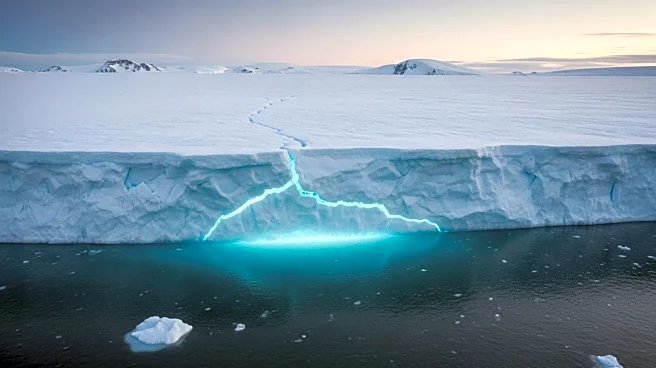What's Happening?
A team of international scientists has discovered methane seeps in the Antarctic seabed, particularly in the Ross Sea, which is part of Antarctica's Southern Ocean. These seeps are releasing planet-heating methane, a gas that traps significantly more heat than carbon dioxide. The discovery was made using ship-based acoustic surveys, remotely operated vehicles, and divers, revealing over 40 methane seeps in shallow waters. This finding is surprising as previously only one active seep was confirmed in the region. The study, published in Nature Communications, suggests a potential shift in methane release patterns in Antarctica.
Why It's Important?
The discovery of these methane seeps is significant because methane is a potent greenhouse gas, trapping around 80 times more heat than carbon dioxide in its first 20 years in the atmosphere. The presence of these seeps could mean that future climate change predictions have underestimated the potential impact of methane emissions. If these seeps release methane into the atmosphere, they could accelerate global warming. Additionally, the methane could have cascading effects on marine life, further disrupting ecosystems. Understanding these seeps is crucial for accurate climate modeling and mitigation strategies.
What's Next?
Scientists are planning to return to Antarctica for further study of these methane seeps. The goal is to analyze the seeps in more detail to understand their behavior and potential impact on climate change. Researchers are investigating whether climate change is influencing the occurrence of these seeps, similar to patterns observed in the Arctic. The study aims to determine if these seeps could become a significant source of methane emissions, contributing to a feedback loop that exacerbates climate change.
Beyond the Headlines
The discovery of methane seeps in Antarctica highlights the complex interactions between climate change and natural gas emissions. It raises ethical questions about human responsibility in addressing climate change and the need for international cooperation in scientific research. The findings could lead to increased scrutiny of methane emissions globally and prompt discussions on policy measures to mitigate their impact.










